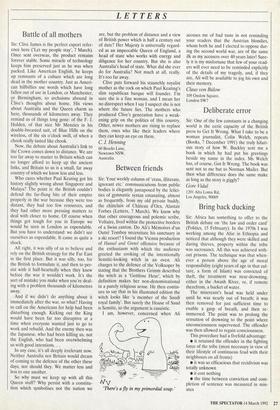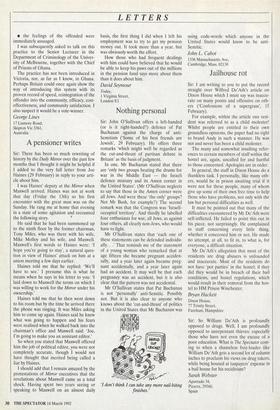Bring back ducking
Sir: Africa has something to offer to the British debate on 'the law and order card' (Politics, 15 February). In the 1970s I was working among the Afar in Ethiopia and noticed that although they were skilled and daring thieves, property within the tribe was sacrosanct. All this was achieved with- out prisons. The technique was that when- ever a person above the age of moral responsibility (eight years of age in that cul- ture, a form of Islam) was convicted of theft, the treatment was near-drowning, either in the Awash River, or, if remote therefrom, a bucket of water.
The miscreant's head was held under until he was nearly out of breath; it was then removed for just sufficient time to enable a gasp of breath, and then re- immersed. The point was to prolong the sensation of drowning to the point where unconsciousness supervened. The offender was then allowed to regain consciousness.
This procedure had a fivefold advantage: • it retained the offender in the fighting force of the tribe (most necessary in view of their lifestyle of continuous feud with their neighbours on all fronts) • it was so efficacious that recidivism was totally unknown • it cost nothing • the time between conviction and com- pletion of sentence was measured in min- utes
LETTERS
• the feelings of the offended were immediately assuaged.
1 was subsequently asked to talk on this practice to the Senior Lecturer in the Department of Criminology of the Univer- sity of Melbourne, together with the Chief of Prisons of Ghana.
The practice has not been introduced in Victoria, nor, as far as I know, in Ghana. Perhaps Britain could once again show the way of introducing this system with its proven record of speed, reintegration of the offender into the community, efficacy, cost- effectiveness, and community satisfaction. I also suspect it would be a vote-winner.
George Lines
17 Lismore Road, Skipton Vic 3361, Australia



























































 Previous page
Previous page